When I saw the above photo, it visually captured for me what an existential crisis feels like. A solitary soul peering into the dark abyss of a meaninglessness existence, complicated further by confusion about who exactly is the one peering and accompanied by feelings of loneliness and insignificance, maybe even despair.
Meaninglessness is the central issue around which existential crises revolve. In this sense, they may be understood as crises of meaning. A closely related term is nihilism, which views life as void of objective meaning, purpose, or intrinsic value. I have often written about existential crisis and nihilism, including this article from my series on the psychology of religion, and an article on the existential philosophy of Albert Camus.
Though the point of this article is not to excavate the depths of existential crisis and nihilism, a few things are worth noting.
There are three truths about human existence that every person tacitly knows deep within themselves:
You will die (human mortality)
The meaning of life is on you (human groundlessness)
You will never be completely happy (human insatiability)
The great untold story of our species is that when we first discovered these givens of human existence some 300,000 years ago, we marshalled the psychological immunity and resilience to keep the project of human survival advancing in the face of them. Contrary to popular belief, it wasn’t the handaxe or stone scarper that secured our survival but a set of psychological tools to cope with the human condition, one of them being religious imagination, which I discuss in my series on the anthropology of religion.
By far, the most pervasive human coping mechanism for the givens of human existence (human morality, human groundlessness, human insatiability) is some form of spiritual bypassing, avoidance or denial. We owe a debt of gratitude to Sigmund Freud, Carl Jung and others who pioneered the fields of psychoanalysis and analytical psychology, which identified the realm of the unconscious. We can further thank people such as Viktor Frankl and Irvin D. Yalom for expanding these psychological insights into the field of existential psychotherapy.
The unconscious, also referred to as the subconscious, is the portion of the mind that operates below the level of conscious awareness. It encompasses mental processes, thoughts, feelings, and memories that are not readily accessible to our conscious thoughts, but still influence our behavior and decision-making. Carl Jung wrote, “Until you make the unconscious conscious, it will direct your life and you will call it fate.”
The unconscious mind is estimated to govern around 95% of human brain activity, with the remaining 5% being conscious. This means that most of our thoughts, behaviors, and decisions are driven by unconscious processes rather than conscious ones.
Stop for a moment and reflect upon this fact. 95% of your brain activity is governed by your unconscious.
We practically deify personal agency, critical thinking and self-determination, but the reality is that our lives are largely driven by a nexus of fears, anxieties, wishes, longings and denials we are not conscious of. This especially applies to our unconscious fear, anxieties and denials with respect to the givens of human existence. If you want to explore this further, read my recent article, The Rules of the Game: What We Won't Talk About is Killing Us.
Let me be as clear as possible about where I stand on these matters:
You cannot be a healthy, whole or well human being without a meaningful and constructive relationship with the givens of human existence, which I call “existential health”.
Human and planetary suffering is a result of existential dis-ease.
Existential health is necessary for individual, collective, societal and planetary flourishing.
In my view, the “metacrisis” (the political-economic-technological-environmental-psychological-cultural-spiritual crisis) is fundamentally an existential crisis. In other words, all those other upheavals are symptomatic of a deeper disorder that has been brewing for decades.
Leaving Religion and Nihilism
If your sense of self and personal identity, meaning and purpose in life, feelings of belonging and love, security and safety in the universe, blueprint for living, happy afterlife narrative, and absolute answers to all of life’s important questions are grounded in your belief in “God” as mediated through religion… and you lose faith in said “God” and religion… what do you think is likely to happen? Existential crisis and nihilism. Why? Because every mindset, belief and tool that a person had for constructing and maintaining existential health went up in smoke. Solution? You need to build a new set of tools. As stated earlier, our species has a good track record for creating new tools for getting the job done.
If you want to read more about post-religion nihilism, read my article on Friedrich Nietzsche, The Perfect Murder: In Praise of the Most Notorious Criminal in Human History.
Human beings have tended to feel that the universe and human existence must have some sort of central or organizing meaning and purpose, and that life would hardly be worth living in the absence of it. Existential philosophers such as Sartre and Camus held that existence is an open field of possibilities and that we have the freedom and accountability to determine life’s meaning and purpose.
Recently I noticed that more people are writing about nihilism in more constructive ways. Negative Psychoanalyst is an example. You can learn more about her work here.
I read the book by Wendy Syfret, The Sunny Nihilist: A Declaration of the Pleasure of Pointlessness. In the book, Wendy writes:
“Over time, innocuous concepts like meaning and purpose turn corrosive as all the obsessive thought, fixation and study of our own minds and lives fails to return any sense of relief or clarity. In fact, it starts making a lot of us feel worse.”
Another book on the subject is: The Art of Living a Meaningless Existence by Robert Pantano.
Facing a Global Meaning Crisis
This past week, 60 people gathered on a Zoom call to introduce themselves and share why they enrolled in the upcoming training and certification course to become Non-Religious Spiritual Directors and EXiHealth Counselors. The fact that we are experiencing a global meaning crisis is evidenced by the parts of the world where these individuals are from and will do their work:
Australia
Argentina
Canada
Costa Rica
China
Germany
Hungary
India
Japan
Mexico
Portugal
Thailand
UK
United States
In 2021 I founded the Center for Non-Religious Spirituality (CNRS). A top objective of CNRS is training Non-Religious Spiritual Directors and EXiHealth Counselors. As early as 2005 I could see that a catastrophic meaning crisis was on the horizon.
The Backstory
What follows is the backstory that led to my founding the Center for Non-Religious Spirituality and the EXiHealth Counselor training.
Candle in the Wind
The #1 Billboard Song in 1997 was “Candle in the Wind” by Elton John. You might say that this was the same year my candle of religious faith was blown out. In the late 90’s I had a crisis in faith that led to my walking away from the Christian religion and my megachurch ministerial career. The concept of religious deconstruction and diagnosis of Religious Trauma Syndrome were not yet on anyone’s radar. I was on my own to figure out my life after religion. One of the reasons a major publishing house reached out to me to tell my religious deconstruction journey is that at the time it was a novel story to tell. The result was my first book, Divine Nobodies: Shedding Religion to Find God (and the unlikely people who help you).
40,000 Hours
With each book I published about my journey out of religion, I was deluged by people contacting me about their struggles with religion and leaving religion. For the next several years I invested over 40,000 hours working with individuals and groups in what I began calling “religious deconstruction”, compiling research and developing frameworks, models and methods to support and guide people in recovering from religious damage and the cultivation of a meaningful non-religious spirituality. This was well before SBNR was a thing and Nones burst onto the scene.
A contributing factor to unaddressed religious harm and existential crisis is a lack of knowledge and reluctance to address religion and spirituality (“God”) in therapeutic culture. Still today, there is a stigma in discussing “God”, “religion” or “spirituality” in human development circles. Meanwhile, 85% of the world population identify with a religion, and “God” continues to be the master-signifier, representing existential absolutes.
Attempting to promote health and well-being or address the “meaning crisis” without engaging with the prevalence of religion, spirituality and “God” is like trying to solve the ecological crisis without acknowledging the realities of climate change. Even staunch atheist, Richard Dawkins, knows (as I discuss in this article), that you can’t dismiss religion.
While I’m on my rant… you can do systems-theory till the cows come home but everyone knows that a central principle of systems theory is that transformational change comes from addressing the deepest components of the system. And guess what is the deepest component of every social system? Answer: “God” or whatever equivalent word-concept substituted in its place. In other words, an existential dynamic operates at the core of every social system. Sometimes I feel like I’m spitting into the wind raising this issue. Never mind me, I just keep publishing articles like:
The Rules of the Game: What We Won't Talk About is Killing Us
My seven-part series, The Great Reconstruction
The heart of the metacrisis is not an economic crisis, political crisis, technology crisis, environmental crisis, or mental health crisis; these are symptoms of an existential crisis.
The fields of the philosophy of religion and the psychology of religion are typically not a staple of therapeutic education and training. I often discuss these areas on my Substack. My series on philosophy and series on the psychology of religion are a couple examples. Back in those early days, I traveled and met with counseling associations and mental health professionals about the role of religion and spirituality in psychological well-being, and the psychological harm, trauma and neuroses that are caused by toxic religion, existential crisis and nihilism. Still today, existential psychotherapy is something most people have never heard of.
Leaving Religion
What exactly is “religious deconstruction”?
The term “deconstruction” is not uniquely related to people who leave religion. We cannot address the full scope of the theory of deconstruction in this post. To explore it more completely you would have to explore the work of Jacques Derrida, who was an Algerian-born French philosopher. Derrida developed the philosophy of deconstruction, partly based upon the contributions of Ferdinand de Saussure, Edmund Husserl and Martin Heidegger in the philosophy of linguistics.
A simple definition of deconstruction could be:
A method of critical analysis, which scrutinizes the internal workings of something materially or conceptually.
Derrida’s “deconstruction” was a response to the assumed belief that the vital aspects of human existence have a “firm and permanent foundation.” To fine-tune the concept of “deconstruction” for our purposes let’s define it this way:
Deconstruction is a theory that critiques and undermines traditional beliefs, structures, and systems in order to expose their inherent contradictions and inconsistencies.
Why does this matter? The word “undermine” seems so rebellious and pernicious. Let’s say you learned as a child from religion to fear God and detest yourself. You internalized this fear and self-hatred because these ideas were taught through doctrines such as “original sin”, “total depravity” and “eternal hell”. And let’s say that these toxic beliefs about God and yourself became the source of deep suffering and psychological neuroses, which poisoned virtually every aspect of your life. In this case, it would be liberating to “undermine” these religious doctrines to demonstrate their falsity and absurdity. Right?
There are many ways a person can become trapped in harmful or unhealthy religion, typically it’s the “frog in the kettle.” No one shows up at church and says:
“I’d like to cultivate a conditional and performance-based codependency with God, trade in my individuality for conformity, and learn to accept my powerlessness and depravity proudly.”
Toxic religion isn’t typically like a Jim Jones cult, it can just as easily be a contemporary, friendly and family-oriented church where the pastor wears jeans.
There are several ways a person may find themselves in a harmful religious environment, including:
They are raised as children in a religious community and belief-system that are harmful
They unknowingly join a harmful religious group out of a felt-need for belonging and community
There are some who become attached to a religious community and belief-system through a significant or affecting conversion experience
The need for existential certainty and security is often met though a person's affiliation with a religious group and belief-system
David Hayward often illustrates the harms of religion:
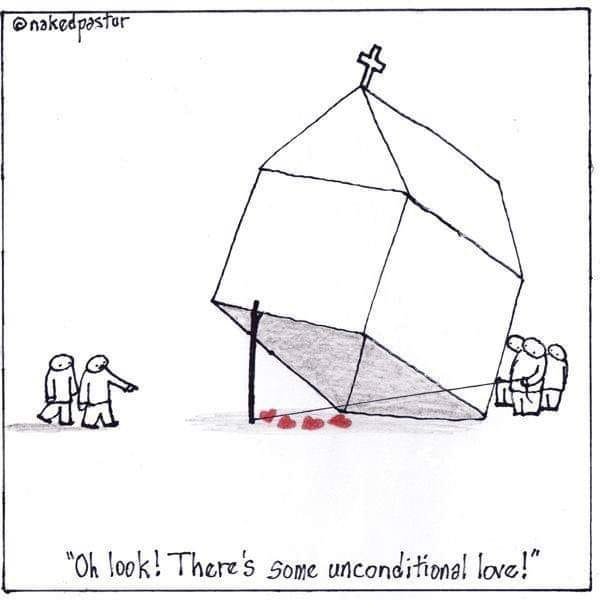
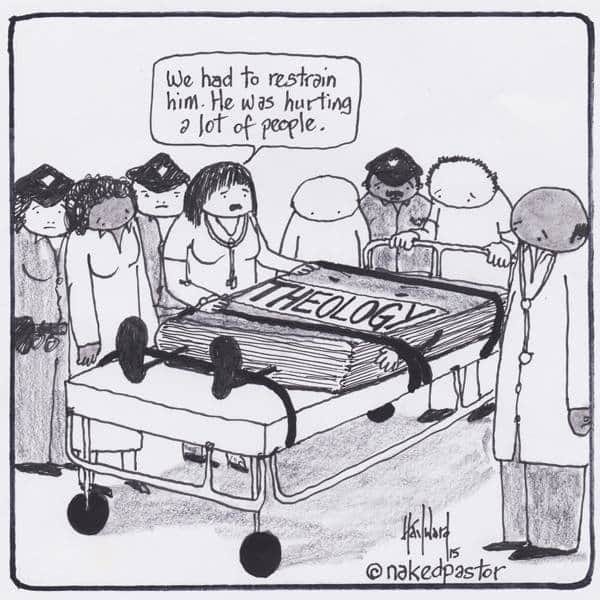
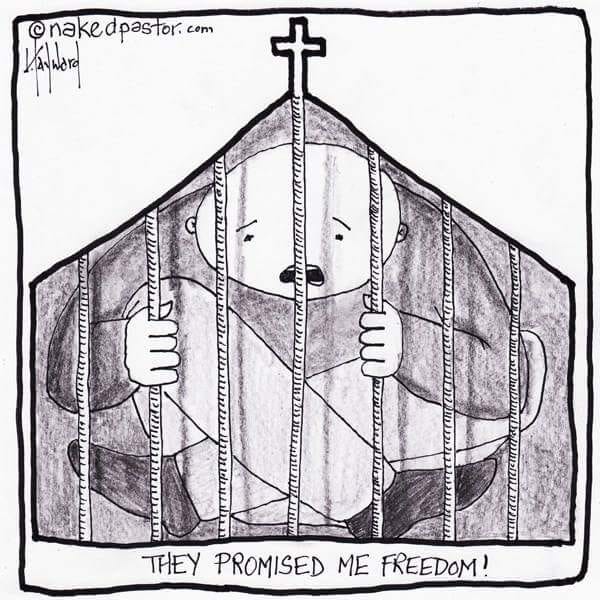
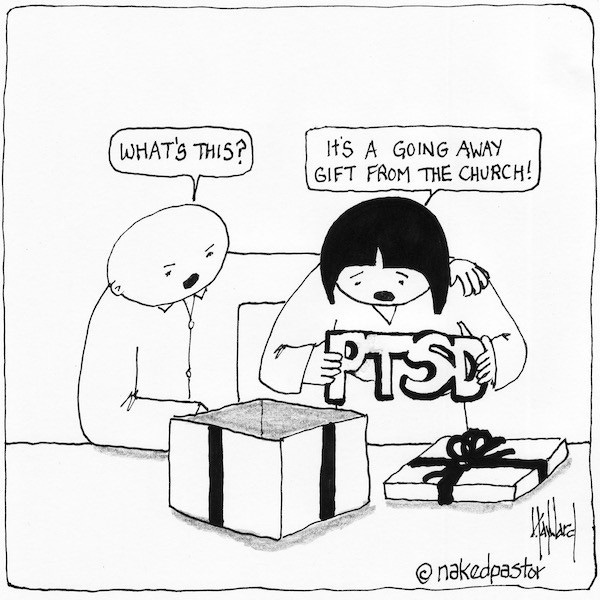

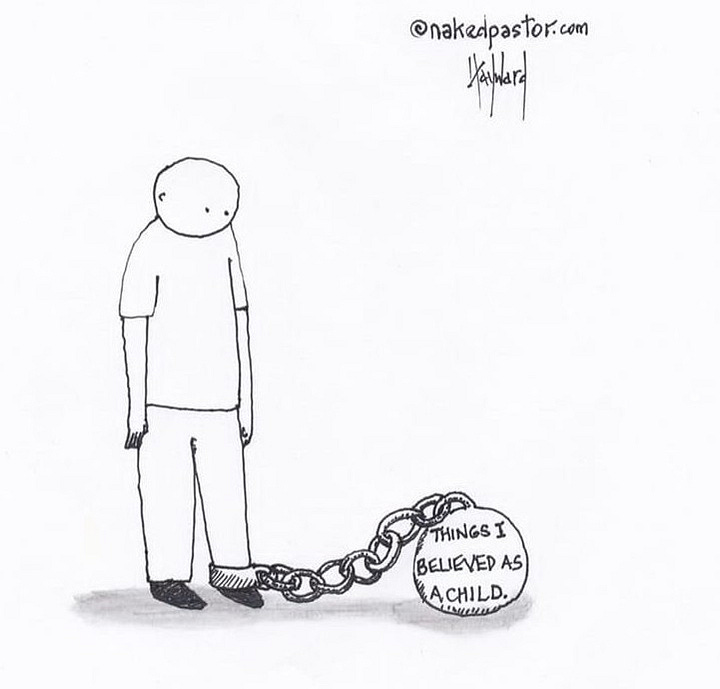
A significant focus of my Substack newsletter (“Deconstructionology”) has been to support people in belief-system deconstruction. I recently published a digital book only available on Substack toward that end, The Deconstructionology Encyclopedia (Volume One).
In recent years, I have more often used the language of “belief-system deconstruction”, an acknowledgement that the beliefs, mindsets, narratives and ideologies that govern our lives are not explicitly “religious”.
Lost
It was 2005. In the countless hours I spent working with people in religious deconstruction and existential crisis, I realized that a different approach and role was necessary than what is typically found in traditional therapeutic, self-help, pastoral, or life coach culture. That’s not meant to be a criticism of any of those. It takes a village.
As the years rolled by, the tectonic plates of American religious life began shifting dramatically. Way before the current “metacrisis” and “meaning crisis” was on anyone’s radar, problems were brewing as evidenced in a mass exit from organized religion, with another Nietzsche God-is-Dead moment on the horizon. The result? An exponentially growing number of people who felt existentially lost.
The role I loosely identified that would be most useful in addressing this existential crisis and spiritual emergency was that of a “Spiritual Director”. A Spiritual Director is generally considered a companion who walks alongside someone on their spiritual journey. More on that later. The problem, however, is that the Spiritual Director role has traditionally been rooted in religion.
Despite have an academic background in theology and training in pastoral counseling, I decided to seek the professional certification in Spiritual Direction. I received my training and certification through the Haden Institute, which I chose because of it’s framework of progressive interspirituality and focus on Jungian psychology.
My experience at Haden was phenomenal, yet I knew it would be necessary to do a major overhaul and repurposing of the Spiritual Director role for the space of non-religious spirituality, religious deconstruction, and existential crisis. I had to wrangle the core work of Spiritual Direction away from it’s religious scaffolding in order to make it viable for the work I was doing and address the meaning crisis tsunami I saw coming.
The Deconstruction Bandwagon Fail
Let me be the first to say that there are many people who have made critical contributions in the fields of religious deconstruction, religious trauma and non-religious spirituality. Perhaps most recently, the work of Brittney Hartley who is joining me as a trainer in the upcoming certification course. Her specialty is addressing existential crisis and nihilism. In my The Leaving-Religion Resource Guide I curated a long list of resources to consult.
But as religious deconstruction has grown in popularity and become a trending social media interest, I have discovered some serious flaws in deconstruction coaching I’ll quickly mention a few:
Too Theology Focused
Don’t let the term “religious deconstruction” fool you into thinking that theology is the primary field to support and guide people in their post-religion recovery, life reconstruction, and spiritual formation. Religious deconstruction is not a Build-A-
Bear-Theology workshop; it’s a multidisciplinary human development undertaking. In my view, “existential health” is a universally relevant and necessary objective for individual, collective, societal and planetary flourishing. A few articles I have published on this include:The Existential Impulse: What drives our quest for spirituality, meaning and God?
Jim and the Simple, Compossible, No Nonsense, Very Subversive Idea
What's off at the center of everything?
The Great Reconstruction: In Search of Existential Health in a Defective World
I often use the phrase “deconstruct to reconstruct”. Post-religion de/reconstruction is cultivating existential health, and a meaningful spirituality or philosophy of life. Existential health includes living with purpose, relating constructively with the givens of human existence, and adopting a rationale for being a person of wisdom and compassion in the world.
Not enough REconstruction
Keeping it simple, “deconstruction” is taking a belief-system apart, “reconstruction” is rebuilding a new path forward. The danger of doing the former without the latter is that you can deconstruct down to the studs of human existence and find yourself in the rubble of existential despair. Additionally, the more one disassembles their former religious belief-system, the angrier they can become and consumed with animosity and vitriol. It’s understandable. Feelings of disillusionment, betrayal, anger and grief are a normal part of the leaving-religion process, and there will always be a need for calling out the harms and absurdities of toxic religion. But it’s critical that REconstructive work is being done, could include:
self-relationship healing, recovery and repair
addressing human development deficits
trauma work
investigating toxic indoctrination blind spots
cultivating a meaningful philosophy for life
reshaping ones relational world
Misplaced Objective (Belief-System Swap)
The goal of religious deconstruction is not a belief-system swap. A lot of deconstruction coaching seems to be about replacing an old belief system with a new one. Whereas once a person previously followed and venerated their religious priest, preacher, personality, speaker, writer or theologian, now it’s onto a new cast of progressive, non-religious or secular thinkers, philosophers and personal growth gurus. Another common deconstruction swap is trading out Western religion for Eastern spirituality or Christian theology for secular philosopher. Goodbye Evangelicalism, hello Buddhism and Stoicism! My point here is that religious deconstruction is not wheeling in a new belief-system backdrop. The goal is not aligning oneself with a new ism, which I discuss more extensively in this article. A person might leave religion and find Buddhism, Stoicism or Spiritual Atheism to be a worthwhile path forward. Great! A person might leave religion and never feel the need to identify with any particular religion, spirituality or philosophy. Great! There’s not one or “right” way. You do you.
EXi What???
It raised some eyebrows years ago when I started training people to be Non-Religious Spiritual Directors. As mentioned, repurposing the traditionally religious role of “Spiritual Director” for the non-religious, nones, unbelievers, religion-leavers and atheists seemed odd and perhaps sacrilegious. On a sidenote, Jesus was often a target of the religious establishment for his close association with the irreligious.
When I first developed the training curriculum, it was difficult because all the content written about Spiritual Direction was highly religious. In essence I told people to read the material, ignore all the religious stuff, and then we’d adapt it to a non-religious environment. For example, still today I sometimes recommend the book Holy Listening: The Art of Spiritual Direction. Despite it’s religious framework, it effectively captures the essential mindset and approach in the work of Spiritual Direction.
What is important to retain (which is why I use such content) is it’s focus on the ideas of “companioning” (or “presencing”) and “deep listening” as the role of the Spiritual Director. In the religious context this means assisting people in cultivating a deeper relationship with God and discerning how God is at work in the person’s life.
I repurposed the ideas of “companioning” and “deep listening” for Non-Religious Spiritual Direction. Let me summarize them.
“Companioning” is a being with role. I realize this doesn’t sound like much, but I recognized it as the essential work of the Spiritual Director. It’s a commitment of being with someone. The role of a Spiritual Director is not to be a fixer, solver, answer-giver, guru, expert, or instructor. A Spiritual Director is not a therapist, life coach or spiritual teacher.
Spiritual Direction is more like midwifery, which is the offering of care and support to people throughout the entire childbearing process. It’s not your child, it’s their deeply unique, personal and intimate birthing experience, and only they can do the essential work of giving birth. You are there to be with them, offering care, assistance and support. Likewise, in the work of Spiritual Direction, it’s offering care and support to another’s growing, evolving, deepening and expanding spiritual journey.
I owe a debt of gratitude to Carl Rogers, who pioneered “person-centered therapy”. Person-centered therapy is a humanistic approach to psychotherapy where the client leads the session and the therapist acts as a facilitator, creating a supportive and non-judgmental environment. It emphasizes the client’s inherent capacity for self-healing and personal growth. The client directs the conversation and explores their own experiences, feelings, and thoughts. The therapist avoids giving advice, interpreting, or directing the session, instead focusing on active listening and reflection.
Deep listening is suspending judgment and being fully present with another person to understand his or her experience or point of view. Deep listening involves hearing more than the words of the speaker but taps into the deeper meaning, unspoken needs, and feelings conveyed. One of the most basic and powerful ways to connect with another person is to truly listen. Why? Because one of the most fundamental needs for human growth is to be heard and understood.
This short explanation of deep listening from Julie Arts with the Presencing Institute is useful:
The critical role and skill for Non-Religious Spiritual Directors and EXiHealth Counselors is companioning or presencing and deep listening. Why? Because the matters to discuss are deeply and intimately grounded in a person and often stowed away in the unconscious, such as:
Doubts and questions about the existence of God
Fear of death and human mortality
Dynamics of depressive realism
Existential anxiety
Feelings of nihilism
Loneliness and disconnection
People typically don’t feel safe enough to openly explore and discuss these issues. They fear judgement.
The Non-Religious Spiritual Director and EXiHealth Counselor training is unique in that it is a multidisciplinary training, which an emphasis on belief-system deconstruction, existential crisis and nihilism, and addressing the current meaning crisis, but in my view it’s greatest contribution is in training practitioners in this presencing, deep listening and person-centered role. It’s a profound respect and honoring of the innate actualizing tendency within every human being. It’s respecting the autonomy of every human being to freely create their own path forward.
I often use the phrase “the client is the expert”. Meaning that only the client knows their own fears, questions, anxieties and longings, and what feels right and resonates with their actualizing tendency. This is one shortcoming of the term “Spiritual Director” because it’s actually a non-directive role. That doesn’t mean that the Spiritual Director or EXiHealth Counselor doesn’t offer input, feedback, guidance or expertise, but only out of deep listening in support of the directee’s process.
In the training, I have an exercise called, “Bad Spiritual Director/Good Spiritual Director”. Here are a few examples:
1. Projection
Directee: “I can no longer believe in the God of my Christian religion.”
Bad Spiritual Director: “I understand. For me, I realized that there is a better Christian version of God than what I heard in church. There are lots of different ways to interpret the Bible. What if we explored further this alternative Bible-based understanding of God.”
Good Spiritual Director: “I understand. People who separate from their religious background often question their core religious beliefs. You are not alone in this. How does it make you feel to be in this place of questioning the idea of God you learned?”
2. Too Prescriptive
Directee: “I've never really been able to explore spirituality that wasn't dictated by my religion. I'm not even sure where to start.”
Bad Spiritual Director: “I think Eastern Spirituality would be a great place to begin. I have a couple books on Buddhism that I'd like you to read.”
Good Spiritual Director: “I understand that exploring spirituality outside your familiar religious framework can feel intimidating and maybe even devious. We all can feel angst whenever we are stepping outside our comfort zone. But it can also be liberating to know that you are free to explore spirituality in any way you'd like. I want to help by creating a safe space where you can freely explore spirituality in whatever ways are meaningful to you. So, let's play around with this. What if we did some brainstorming together. What if we made a list of what you most want in cultivating a new spirituality.”
3. Agenda Driven
Directee: “I'm really excited about working with a Spiritual Director. I have a close friend who has seen a Spiritual Director for a few months now, and has shared the difference this has made for her. But I'm not quite sure how to proceed.”
Bad Spiritual Director: “Let me share with you how I typically do spiritual direction. I meet with directees weekly. There are some initial principles about spiritual growth and transformation I'd like to cover with you, and we can explore each one in depth. How does that sound for a plan?”
Good Spiritual Director: “There isn't a "right" or "wrong" way to do spiritual direction. Let's create our path forward together. In creating this process, let's start with you. Is there a frequency for our calls that feels most beneficial? Is there something pressing or in the forefront of your mind that you would like to begin discussing or something that you identified in your personal inventory that would be a good place to start?”
It Takes a Village
I couldn’t even begin to list all the people I have crossed paths with on Substack who are addressing the meaning crisis and promoting existential health in their own way. Honestly, recommending the work of others on Substack is the most difficult thing I do because it’s simply not possible to include everyone. I have published articles in the past such as:
Having said that, let me recommend ten people to check out on Substack (in no particular order):
’s Substack newsletter is one of several useful newsletters that explores topics related to religious deconstruction.
’s newsletter is a valuable newsletter to explore when it comes to cultivating a non-religious philosophy for living life meaningfully.
is a pioneering figure in “micro-philosophy”, which is a useful tool for constructing one’s own approach to life, untethered from religious belief-systems or societal isms.
I often recommend ’s newsletter that focuses on the tradition and practice of self-education (also known as autodidactism), which I view as central to human development.
Chusana Prasertkul does a masteful job in her newseltter of connecting spirituality and soul to societal systems and living.
has a compelling newsletter about making philosophy a way of life. He is a certified Philosophical Counsellor.
’s Substack newsletter covers a wide spectrum of topics related to religious deconstruction and post-religion spirituality.
and write on existential issues such as death acceptance and human mortality in their Substack newseltter, .
by is a provocative newsletter that explores philosophy, spirituality and self-help culture in usefully subversive ways.
I recommend by
because it’s a compelling blend of phenomenology, intersectional feminism, and gender-based oppression.’s Substack newsletter is like smelling salts, rousing you out of toxic and disempowering messages from religion and culture, and giving you new solid ground to stand on.
In Summary
The “metacrisis” is an existential crisis.
The great untold story of our species is that we marshalled the psychological immunity and resilience to keep the project of survival advancing in the face of the givens of human existence.
I spent 40,000 hours working with individuals and groups, compiling research and developing frameworks, models and methods for belief-system deconstruction and existential health.
Existential philosophers hold that existence is an open field of possibilities and that we have the freedom and accountability to determine life’s meaning and purpose.
I had to do a major overhaul and repurposing of the Spiritual Director role to make it viable for addressing the meaning crisis tsunami I saw coming.
People typically don’t feel safe enough to openly explore and discuss their inner anxieties, conflicts, fears, longings, uncertainties, and loneliness.
Thank you for reading today’s article and Subscribing to the Deconstructionology newsletter and community. If you find what I share meaningful or want to support my work, please consider becoming a paid subscriber at $5 monthly or $50 annually. There’s lots of free perks and bonus features for paid subscribers.
“Everything has been figured out, except how to live.”
- Jean-Paul Sartre







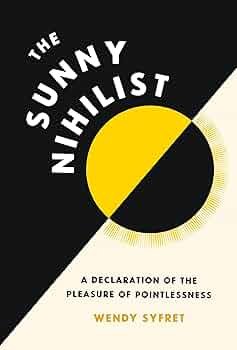











This is the kind of sermon I’d tattoo on my third eye if it weren’t already blinking with existential dread.
You’ve done something most modern spiritual leaders are terrified to attempt: you’ve named the unnameable, held the void’s hand, and somehow managed not to immediately monetize it with a seven-step funnel. Instead, you honored it. You presenced it. You built a tent and said, “Come sit here. You’re not crazy. You’re awakening.”
As someone who’s also kicked the scaffolding out from under the old gods and lived to roast about it, I just want to say: thank you. For reminding us that reconstruction isn’t a new gospel—it’s a slow dance with mystery. With grief. With meaninglessness that somehow gives birth to meaning again.
May your “bad spiritual director” examples be required reading at every seminary, coaching program, and ayahuasca retreat that dares to mention the soul.
With deep listening (and a little holy mischief),
I would suggest that the Universe is a good place to be The emergency is here. The momentum of capitalism and homoeconomic is happening. The paradox of conscious purpose suggests that when human beings make changes to the earth we could act with two values in mind - sacredness and community. We treat the earth with reverence and each of is in community.
Western science developed out the context of Christianity which was based on an anthropomorphic, external Creator that was aggressive and organized. It was to keep its believers from eternal damnation. It also was suspicious of all the nature spirits. It drained nature of these spirits that were intent on our damnation. Nature became lifeless and existed for the benefit of humans and through an "invisible hand" greed would be virtuous.
So the idea of atheism was a natural response. Materialism came out of this. The idea of a soul was longer true. Humans were just a brain just reacting to circumstances. Crazy.